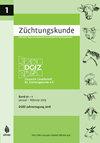这四个星期使用的旱种食物对体重产生影响,同时也影响到头一个乳酪哺乳期和哺乳期食物的摄取
IF 0.2
4区 农林科学
Q4 AGRICULTURE, DAIRY & ANIMAL SCIENCE
引用次数: 1
摘要
研究了出生后最初几周两种不同饲养强度对荷斯泰因-弗里西亚犊牛体重发育以及随后的产奶量和采食量的影响。在犊牛出生后的头4周,分别饲喂自由采食(AdL;N = 38)或限制性(RES;N = 30)。4周后的饲喂和整个试验期间的饲养情况相似,adl犊牛前4周的平均乳能摄入量高于res犊牛(p < 0.01)。各组之间的平均前菜摄入量没有差异(p = 0.08)。adl犊牛在出生后4周内的平均日增重高于RES犊牛(p < 0.001),而第一次产犊的年龄没有差异(p = 0.3)。第一次泌乳时,adl组泌乳量高于res组(p < 0.05),采食量也高于res组(p < 0.05);牛奶蛋白和乳脂的浓度没有差异。结果表明,在生命早期增加喂养强度对第一次泌乳的产奶量有积极的长期影响。本文章由计算机程序翻译,如有差异,请以英文原文为准。
Einfluss einer ad libitum Tränke von Holstein-Friesian Kälbern während der ersten vier Lebenswochen auf die Gewichtsentwicklung sowie auf Milchleistung und Futteraufnahme in der ersten Laktation
The impact of two different feeding intensities during the first weeks of life of Holstein-Friesian calves on weight development as well as subsequent milk production and feed intake was assessed. During the first four weeks of life calves were fed either ad libitum ( AdL; N = 38) or restrictively (RES; N = 30). Feeding after the 4th week of life and housing throughout the experiment were similar in both groups The average milk energy intakes during the first four weeks were higher in AdL-calves compared to RES-calves (p < 0.01 each). The average starter intake did not differ between groups (p = 0.08). In AdL-calves the average daily gain was higher compared to RES calves during the first four weeks of life (p < 0.001), whereas age at first calving did not differ (p = 0.3). During the first lactation the AdL-animals gave more milk which was accompanied by a higher feed intake compared with the RES-animals (p < 0.05 each); no difference in the concentrations of milk protein and milk fat were determined. The results indicate that an increased feeding intensity during early life has positive long-term effects on the milk production potential in the first lactation.
求助全文
通过发布文献求助,成功后即可免费获取论文全文。
去求助
来源期刊

Zuchtungskunde
农林科学-奶制品与动物科学
CiteScore
0.50
自引率
40.00%
发文量
0
审稿时长
>36 weeks
期刊介绍:
Die Züchtungskunde wird als wissenschaftliche Zeitschrift von der Deutschen Gesellschaft für Züchtungskunde e.V. herausgegeben. Sie dient dazu, Ergebnisse der wissenschaftlichen Forschung in den Disziplinen Tierzüchtung, Tierhaltung, Tierernährung, Tierhygiene und Fortpflanzung der Nutztiere sowie der mit der tierischen Erzeugung im weiteren Sinne befassten Wissenschaftsbereiche zu veröffentlichen. Die Beiträge müssen wissenschaftlich qualifiziert sein und Themen behandeln, die für die Forschung, Beratung und Praxis in der Tierproduktion von angemessener Bedeutung sind.
 求助内容:
求助内容: 应助结果提醒方式:
应助结果提醒方式:


